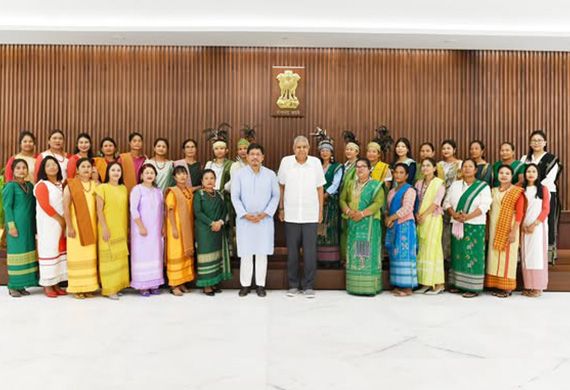
Meghalaya Women SHG Delegation Meets Vice President Jagdeep Dhankhar in New Delhi
By: WE staff | Wednesday, 14 May 2025
- A 30-member women delegation of Meghalaya's Self-Help Groups (SHGs) called on Vice President Jagdeep Dhankhar at New Delhi
- The Vice President welcomed the delegation to his residence on Tuesday
A 30-member women delegation of Meghalaya Self-Help Groups (SHGs), facilitated by the National Rural Livelihoods Mission (NRLM), called on Vice President Jagdeep Dhankhar at his official residence in New Delhi on Tuesday. The delegation was accompanied by senior State Rural Livelihoods Society officials and led by Meghalaya Chief Minister Conrad K. Sangma.
In his social media message, the Chief Minister was delighted with the visit of the delegation, calling it "an honour and encouragement" to Meghalaya women. "From all corners of the state, SHG members have become symbols of strength and hope in their villages. Their determination and grit have not only broken glass ceilings but are also creating pathways for others," he added.
The trip, facilitated by the CM, is under a routine programme to provide national-level exposure to grassroot women leaders and to acknowledge their role in community development. According to an official release, the Vice President welcomed Meghalaya's initiative towards women empowerment, maternal health and nutrition, and women-driven growth.
The state has observed a sharp increase in the involvement of women through SHGs and local institutional setups. Whereas there were about 5,000 SHGs in 2015, now the number has increased to nearly 52,000 operational groups, involving over 5.2 lakh women. Furthermore, the number of women-headed Village Employment Councils (VECs) also increased fantastically between 2022 and 2024.
The latest achievement under this effort is the formation of Pla Tangka Cooperative Society-the very first apex women's financial institution in the state of Meghalaya-warranting economic empowerment and financial inclusion. The initiative is also aligned with the project's overarching aim of bolstering human development outputs through the help of leadership coming from grassroots groups.
Most Viewed
- 1 Women's Health Startup HerMD Closing Doors Amid Industry Challenges
- 2 5 Famous Women in Indian Armed Forces
- 3 Saudi Women No longer Require Male Permission for Clothing Choices, says Prince MbS
- 4 Kolkata Medtech Startup Innovodigm Raises Rs 5.5 Crore Seed Funding Led by IAN Group
- 5 Yamunanagar's Kashish Kalra Honoured after Securing 111th Rank in UPSC Civil Services Exam
- 6 Madurai Appoints Its First Woman Corporation Head
- 7 IAS Vijayalakshmi Bidari Appointed as the new Nagpur Divisional Commissioner
- 8 American Entrepreneur Lucy Guo Overtakes T Swift to become Youngest Female Billionaire
- 9 ICC Women's World Cup 2025 Trophy Showcased at Indore's Holkar Stadium
- 10 Aparna Saxena's Beauty Venture AntiNorm Launches in India
- 11 Vidya Nataraj Co-Founded BlueStone Jewellery & Lifestyle files IPO
- 12 5 Women Freedom Fighters of India
- 13 Dr. G Krishnapriya appointed as CEO for Trichy
- 14 M3M & Sirona Partner to Introduce Menstrual Hygiene Vending Machines in 15 Locations
- 15 Punjab Govt launches SHE Cohort 3.0 Supporting Tech-led Women Startups
- 16 Indian origin Lawyer, Sweena Pannu appointed as the US New Superior Court Judge
- 17 The Aurora Tech Award recognizes 4 Indian Women-led Startups
- 18 Kerala's Republic Day parade featured an all-female tableau
- 19 Manisha Kabbur Becomes Karnataka's First Woman International Karate Coach
- 20 Director K. S. Ravikumar's Daughter Maalica Ravikumar Launches Life Coaching Company 'Evergrowth Academy' for Women
- 21 Leezu's Raises Pre-Seed Funding to Accelerate Growth in Sexual Wellness Industry
- 22 Sattu: Super-easy summer drink for PCOS gut healing
- 23 Swathi Nelabhatla creates Sitha App, India's First Women-Exclusive Gig Platform
- 24 7 Timeless Female Kathak Dancers & their Iconic Legacies
- 25 Meet 7 Iconic Women Architects of Modern India & their Most Impactful Work
- 26 This Woman-led Insuretech Startup is Helping Bridge the Education Financing Gap in India
- 27 Women Leaders Share Lessons Learnt from India Women's WC Win
- 28 5 Enterprising Women Founders Powering Singapore's Tech & Innovation Landscape
- 29 4 Women. 4 Stories. One Vision for Smarter, Stronger Healthcare
- 30 Global Gender Gap Narrows to 68.8%, But Full Equality 123 Years Away: WEF Report 2025
- 31 Changemakers: 7 Women Entrepreneurs Taking the Make in India Movement Forward
- 32 Meet Lucy Guo, The Youngest Self-Made Female Billionaire Disrupting Tech
- 33 How Women are Driving India's Festive Online Shopping Surge


.jpg)



